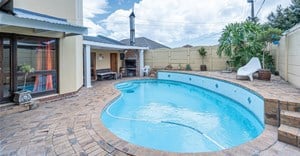
Sustained increase in residential property sales = economic, social stability

Dr Andrew Golding, CE of the Pam Golding Property Group comments: "It's not unusual for property to take over as a primary area of investment when other options appear unpredictable. Residential property offers strong incentives for investors, with capital growth being the primary attraction and a reliable rental return another.
"Some remarkable increases in home sales volumes and value - over 25% in 'hot spots' within our national network of sales offices - are a strong indicator of a swing to residential property investment. While the top end of the market has been inclined to lead the trend, it is closely followed by medium and lower priced properties. We believe this is a trend that will continue for the foreseeable future."
Laurie Wener, MD of Pam Golding Properties (PGP) in the Western Cape metro region says that a by-product of home ownership is social stability. "It's a long-held and well-supported belief that people who own their homes have a stronger sense of security and social responsibility. Home ownership is and always has been a driving motivation in South Africa.
"As a province with a high per capita home ownership among individuals over 40, the Western Cape is also largely a socially stable community. Home ownership is a major factor in creating and sustaining a viable middle class, the cornerstone of a healthy economy," she said.
The region continues to be, in terms of top and lower end property prices, a Cape of contrasts, with recorded sales of over R100 million on the Atlantic Seaboard and R70 million in the Southern Suburbs for single dwellings, yet on the other hand, comfortable, attractive homes for sale around R1 million.
Still a big head of steam in the Cape residential property market
There is, says Wener, still a big head of steam in the Cape residential property market, which shows no sign of topping out. According to market statistics, listing prices at the top end of the Clifton market for instance, are closer by 12% to being met than in 2013, when the average listing price in the suburb was R13,868,276 and the selling prices were 20% less. To date in 2014, the average selling price in Clifton is R17,541,481 - only 8% less than listing price, representing an average price, year on year which is 26.5% higher than last year.
Buyers at the top end of the market are also to be found investing in lower priced properties such as flats and town houses - very often for occupation by their student children, ageing parents or even in some cases, employees.
Agents have reported the sale of a 135sqm Sea Point apartment for R200,000 more than its asking price of R3.35 million, within one day of it having been listed.
"The market has its problems right now - but they are not about selling prices or demand. The real problem, resulting from years of caution in the property development industry, is a serious shortage of stock," says Wener.
















